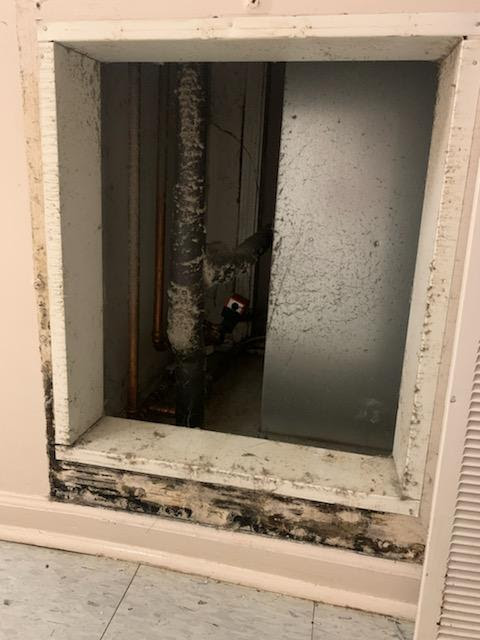During the second week of class this semester, Libby Hamilton ‘24 began feeling ill. Her throat was swollen and she could not breath well. Hamilton has rheumatoid arthritis, is immunocompromised, and takes immunosuppressants for her condition. A discovery of black substance in the vents of her apartment led her to suspect that mold growth could be the reason for her additional health issues.
According to the CDC, people with “weakened immune systems,” such as Hamilton are predisposed to be adversely affected by mold. Ashley Tillman ’24, her roommate, is also prone to react to mold due to her asthma. Tillman experienced symptoms such as coughing around the time Hamilton began feeling sick. Tillman slept with an air purifier in her room. One night she left her air purifier in the hallway and said she “woke up in a coughing fit.”
A few days after the two students began experiencing symptoms, Hamilton and her roommates in North Village Apartment building E 101 opened their intake vent. The inside of the vent had dust and a black substance that they suspected to be mold. After opening the vent, Hamilton began to feel worse.
Hamilton and her roommates contacted an RA and were put in touch with Housing administration. They also submitted a maintenance request. Facilities then arranged for their apartment to be mold tested.
During the discovery of potential mold in their apartment, Hamilton sought medical help for her symptoms. She visited Earle Health Center three times. The first provider from Earl told her that her symptoms were not related to “mold or allergies.” After her symptoms persisted and worsened, Hamilton returned to Earl and Anne Gilchrist, the Medical Director, recommended that she go to the hospital. Her physician at the hospital recommended that Furman request environmental testing.
Furman facilities hired a mold inspector to conduct environmental testing. Following this test, Hamilton requested for Ron Thompson, Director of Housing and Residence Life, to send her the results. Thompson told Hamilton and her roommates over email seen by The Paladin that “the environmental hygienist stated you are safe continuing to live in the apartment,” without sending documentation of the results. Hamilton and her roommates then requested again that the full report be sent to them. According to Hamilton, Thompson initially told her over the phone that the test could not be shared for “legal reasons,” but he later sent the test to her after she and her roomates asked repeatedly.
Air samples from the test Thompson sent were invalid due to the windows being open and an air purifier being on.
While the air samples were voided, the swab tests were an accurate assessment of the mold growth. The mold swab test indicated that there were heavy levels (over 10,000 spores) of Stachybotrys or black mold.
An additional test of the apartment done by another certified mold inspector also concluded that there was a “very heavy”, or upwards of 10,000 amount of fungal spores from a sample. The second test results also indicated that there were leaks, water staining or condensation surrounding or inside of the HHAC unit, ducts or registers. The inspector noted that the ductwork was “filthy” and needed cleaning.
When Hamilton and her roommates initially discovered mold, Hamilton stayed in another apartment due to the return of her symptoms upon re-entering her apartment. Air scrubbers were placed in the apartment. In order to accommodate Hamilton, Housing would later provide housing in the Vinings apartments for her and her roommates.
While Hamilton was relocated to the Vinings, Furman Facilities Services completed remediation steps in the apartment that included HEPA vacuum, air scrubbing and drywall replacement.
When they were expected to move back into their original apartment before fall break in October, Hamilton requested another mold test. Housing sent her a test that indicated that the levels of black mold in the apartment were still higher than the outside levels. Hamilton met with housing to let them know that she was not comfortable moving back into the apartment, and they allowed her to stay in the Vinings. According to Clinton Colmenares, Furman’s Director of News and Media Strategy, “we do not move our students back into their rooms until we are confident it is safe to do so.”
Facilities ordered multiple tests of the apartment shared with Hamilton which indicated that the amount of black mold has decreased in the apartment since the remediation process.
According to Hamilton, when her mother contacted Thompson over the phone in September, he told her that some apartments “always have mold problems.” Colmenares stated, however, that “no living spaces have had recurring mold problems.” In regards to North Village apartments, Colmenares said that prior to moving in, apartments are inspected to “ensure that residences are clean and safe.” According to Colmenares, 6 apartments were reported to have mold in the past two years, and “Furman corrected these issues.”
Renovation of North Village has begun, and some structural improvements have been planned to prevent mold. According to Colmenares, “the envelope of each building will be improved with the installation of new windows and a new vapor barrier.” The Paladin reached out to Thompson, Jeff Redderson and Rick Schoscky from facilities, and Colmenares to ask if more testing and remediation is planned for North Village prior to renovating, but they have not provided a response to that question.
In regards to her experience with mold, Hamilton expressed frustration with the way in which Housing has communicated with her. Tillman echoed Hamilton saying, “their response is so slow for something that could be such as health problem.” Struggling with her health in September as a voice major, Hamilton said, “I can’t even do the one thing I’m here to do.” Since moving to the Vinings, Hamilton’s health has improved.




































